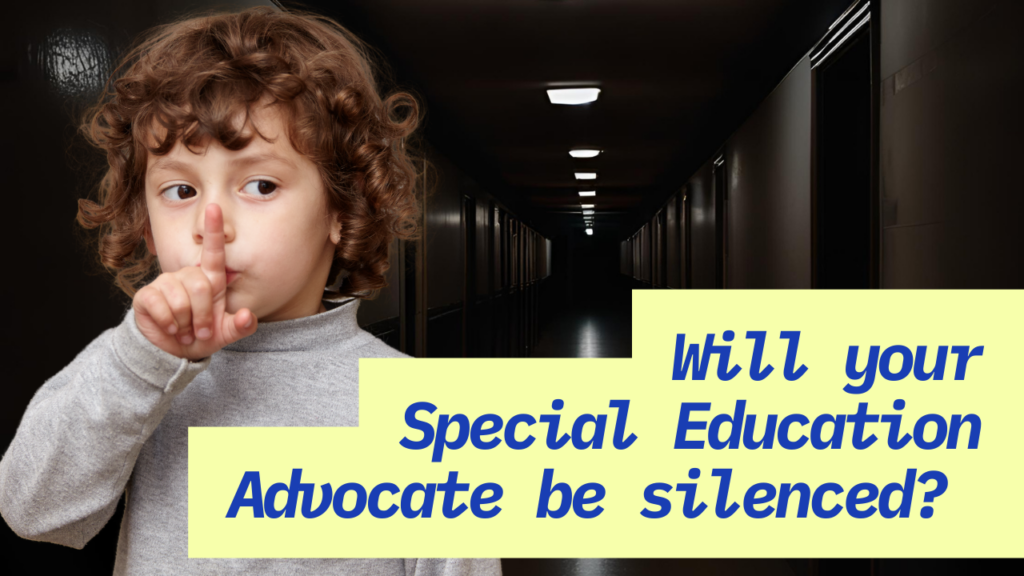Unfortunately, many states attempt to curtail the role of a Special Education Advocate in providing advocacy for Special Education issues and participating in IEP meetings. Over the years several states have introduced legislation that the bill authors claim protects families from unscrupulous consultants. These bills often fail to pass out of one committee or another.
Texas is one state that may succeed with a bill to require additional training in Due Process Hearing representation and the school-level provision of ‘how to complain about an advocate’ information along with the Notice of Procedural Safeguards.
Do Parents Need Special Education Advocates?
If the latest version of House Bill 1813 is signed into law, it will have the intended consequence of chilling parent advocacy. In its current form, the premise is that parents can do this without an advocate, all they need is more information from the school.
This blog explores how difficult a negotiation for special education services can be for a parent, by comparing it to a business negotiation. Does a booklet and state-sponsored training for advocates benefit parents by providing more information?
The school meeting
A mother named Elena steps into the IEP meeting room with trembling hands. Her son, Mateo, was recently diagnosed with Autism, and this is her first time facing the school team. Across the table sit six professionals: a school psychologist, a special education teacher, a case manager, a Speech language pathologist, her son’s Math teacher and the assistant principal.
Each one has a computer open, copious notes and there is a recorder sitting in the middle of the table. Elena has a folder stuffed with speech reports, a note from Mateo’s therapist, and the deep worry only a parent can carry.
As the meeting begins, the school staff flip through data with ease. They talk in acronyms: FAPE, LRE, BIP. Elena tries to keep up but feels like she’s fallen into a foreign language class without a translator. The agenda is read, and the meeting moves fast. She hears words like “adequate progress” and “instructional accommodations,” but what about what Mateo actually needs?
This moment, familiar to countless parents, lays bare a fundamental imbalance: Who truly holds the power?
Under the Individuals with Disabilities Education Act (IDEA), parents are legally equal participants in their child’s IEP team. They’re supposed to have a seat—and a voice—at the table. But in practice, parents like Elena often feel like outsiders at their own child’s meeting and this can lead to pressure or deference from the school members.
Understanding negotiation principles is a practiced skill and can be the game-changer. Without legal training, coaching and practice parents can walk into IEP meetings seemingly informed, composed, and ready to advocate, but feel unheard. If the meetings are complicated, one person alone may not be able to participate fully.
🧠 Power Isn’t Always Shared—Here’s Why It Matters
Business Negotiations: A Balance of Leverage
Business negotiations typically involve parties with similar clout. A vendor and a buyer both want a good deal. Two companies may partner to boost profits. The tone is strategic, the process mutual. Both parties are expected to come prepared, and they usually have the authority to make decisions.
IEP Meetings: A Lopsided Table
IEP meetings often don’t work like this. The school team arrives unified, familiar with the system, the child, and each other. They have control over language, timelines, and services.
The parent? They may be grieving a diagnosis, confused by education jargon, and emotionally drained. They’re called an “equal team member,” but without training, time, or support, that equality is hard to practice.
Questions to Reflect On:
Have you ever felt outnumbered in a meeting that was supposed to include you?
How do you assert yourself when everyone else at the table seems more informed?

🎯 Different Goals, Different Games
Mutual Profit vs. Legal Obligation
In business, both sides usually want to walk away with more. They want profit, partnerships, and long-term gain. Negotiators are seeking a zone of possible agreement.
IEP meetings aren’t about profits. They’re about rights. The legal requirement under IDEA is to provide FAPE—a Free Appropriate Public Education. This isn’t about what’s convenient for the school; it’s about what’s appropriate for the child.
When the School’s Budget Becomes the Unspoken Priority
Sometimes, what the child truly needs is more than what the school is willing to offer. It could be a dedicated aide, private speech therapy, or a different placement. Budget concerns aren’t supposed to influence the IEP—but they do.
And when parents push back, they risk being labeled “difficult” or “unrealistic.” The school may frame limits as “compromises” despite the IDEA requirement of individualized-not-one-size-fits-all solutions. For example, this compromise may be ignored with a skip to placement options instead of discussing needs and services first.
Actionable Tip:
Ask your advocate how they can pose this statement, “My child requires this service to access FAPE” without offending the team, or getting a defensive response.
🔍 Who Controls the Information?
Business: Due Diligence and Open Books
Before a business deal, both parties do their homework. They review numbers, hire consultants, and set terms. If something feels off, they walk away. They may keep talking.
IEP Meetings: The School Holds the Data Keys
The school evaluates, interprets, and often controls when and how information is shared. Parents frequently receive evaluation reports just before or during meetings. Sometimes, they’re written in dense educational language.
Parents who are confronted with this steep- and sometimes sudden- learning curve, struggle to keep on top of the flow of information, taking time off work and spending family time researching and pondering over IEPs. Timelines and procedures may not be fully explained and the electronic copy of the IEP may be overdue.
Reader Reflection:
Have you ever received an evaluation report you didn’t fully understand?
Did you feel comfortable asking for an explanation?
Actionable Tip:
A Special Education Advocate knows how to get data quickly and, where none is “available” they can create an alternate narrative that might include an IEE.
🚪 When Walking Away Isn’t an Option
Business: Strong BATNA = Stronger Leverage
BATNA means Best Alternative To a Negotiated Agreement. In business, if talks fail, parties can choose other vendors, sue, or walk away.
IEPs: Parents Have Weak BATNAs
Most parents can’t afford to pull their child out of public school despite the lure of vouchers to offset private costs. Due process complaints, private placements, and state complaints are costly and slow.
Business negotiators are rarely expected to navigate administrative hearings while parenting a child with a disability. Parents are in a vulnerable position as schools are better resourced to outlast or outmaneuver complaints.
Actionable Tip:
Strengthen your BATNA:
Connect with a Special Education Advocate
Join a parent support group.
Keep detailed records and communication logs.
Ask Yourself: If your child’s needs aren’t being met, what real alternatives do you have?
🧵 Who’s Running the Room?
Business: Neutral Space, Professional Distance
Meetings are often held offsite or in neutral venues. Everyone knows the rules. There are agendas and follow-up procedures.
IEPs: Home Turf Advantage
(For the School) Parents meet on the school’s timeline, in their space, using their protocols. Meetings feel rushed. The environment is emotionally charged. The stress of trying to complete an IEP meeting in 45 minutes adds to the challenges and the pressure to sign. Multiple continuation meetings may need to be scheduled.
Resolution Tip:
Ask to record the meeting.
Bring your Special Education Advocate.
Request more time or follow-up meetings.
Even the most experienced and knowledgeable parents miss important points and forget a topic they wanted to discuss. The advocate by your side is likely to correct oversights and address everything from your planning document.
Reader Prompt: Do you feel like you’re being heard—or hurried?
🧹 The Real Emotional Toll
IEP Negotiations Are Personal, Not Transactional
In business, it’s just work. It’s not something that you take home or directly impacts your immediate family. In Special Education, it’s your child. The stakes are personal. Emotional overwhelm can make it hard to speak clearly or remember details.
Actionable Tip:
Take breaks when needed. Have your advocate ask questions while you supply the details and perspective.
Ask your advocate to ghostwrite communication and send follow-up emails to confirm and clarify.
🧠 Hypotheses: Why Negotiations Break Down in Both Settings
In Business: Ego and reputation issues
Parties may walk away even when the agreement is possible due to personal egos or brand reputation. There may be a lack of transparency and misaligned incentives may sabotage deals.
Over-preparation can block flexibility with less creative thinking in the negotiation.
In Special Education: Information imbalance
Jargon-heavy language is a barrier in meetings. It can also be district, or state specific and no one provides an acronym list for this issue. Little or poor communication training for both sides and failure to consider expertise (parents are viewed as only “parents.”).
Reader Reflection: Have you ever experienced a moment where collaboration turned a difficult meeting around? What made that moment work?
🛠️ So What Can You Do About It? Tips for Parents Preparing for IEP Meetings
IEP meetings are inherently more complex for parents because:
- The stakes are personal, not commercial
- The legal framework (IDEA) is both a shield and a maze
- The imbalance pf knowledge, preparation and procedural control makes it unlikely that a parent would have an equal footing – unless they have training, support and representation
Learn your rights: Review IDEA regulations (34 CFR §300)
- Bring a written agenda
- Take your own notes
- Ask for evaluations in advance
- Use legal language: Instead of “I want,” say “IDEA requires”
- Bring a support person or Special Education Advocate or, if you have minor points of disagreement, consult with an advocate before the meeting.
🗺 Final Reflection: Advocacy Is a Skill—And a Right
Closing the Story Loop
Let’s revisit Elena. She walks into her next IEP meeting holding a binder with tabs. She knows her rights. She brought her Special Education Advocate. The advocate prepared her for possible scenarios and outcomes. She’s not dreading the meeting anymore. She submitted an agenda and requested the data early.
The same people sit across from her, but this time, she asks clarifying questions. She refers to IDEA. She doesn’t fold when things get uncomfortable. She remains calm and confers with her advocate. And she walks out with a plan that actually fits Mateo.
A Question for You:
Have you ever felt like the only one advocating for your child? What helped—or what would have helped—you feel more empowered?
Reach out to Lumen Advocacy today and shift your IEP meetings from stalled to productive.
📚 Sources:
Harvard Program on Negotiation: www.pon.harvard.edu
Individuals with Disabilities Education Act (IDEA), 34 CFR §300
Wrightslaw Special Education Law and Advocacy: www.wrightslaw.com


0 Comments